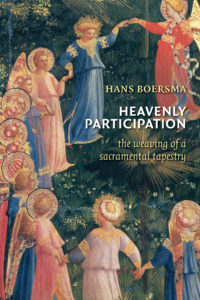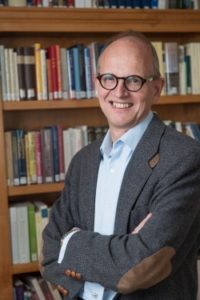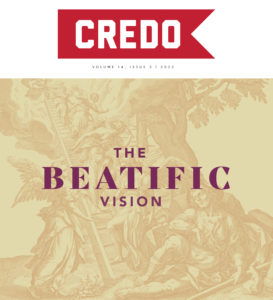Lots of Christians regularly pray, read the Bible, attend worship services, and take the Lord’s Supper. But how many of them still struggle to articulate exactly how it is that they enjoy communion with the Triune God? Thanks to the excellent theological retrieval done by Hans Boersma and others, Christians are being urged to reconsider metaphysics to recover a participatory understanding of being, and in turn, a sacred view of the world. To learn more about this theological retrieval project, Credo Editor Lance English sat down with Hans Boersma to ask him 10 questions about metaphysics, ressourcement, and the local church.
1. You embody a desire to retrieve the “sacramental ontology” of the pre-modern tradition. What do you mean by “sacramental ontology.”
In the modern period, we tend to define the world around us by what we observe, which is to say, empirically. Often, we do not go beyond the world of the senses. But the premodern world saw this-worldly, material things (the objects that we perceive empirically) as related, or linked to greater, other-worldly, spiritual realities.The presence of the Word of God in creation is a real presence, not just an imaginary presence. Click To Tweet Everything that we observe, for a premodern mind, was connected sacramentally to the eternal Logos or Word of God, in which they all cohere. If this is the correct perspective (which I think it is), then everything we observe with the senses is like a small-s sacrament, in which the Logos makes himself present in some way. This presence of the Word of God in creation is a real presence, not just an imaginary presence. So, the presence of God in the world is sacramental. A view of the world (an ontology) that assumes this participatory or real link between heaven and earth is sacramental—hence the phrase “sacramental ontology.”
2. How does the language of “participation” help us grasp the nature of what it means to be a Christian?
I already dropped the word “participation.” This language affirms that things of this world have their being or existence not of themselves but by participating in the eternal Word of God. This claim is important for our everyday lives, for it means that we affirm that the created world is sacred, and that we should treat it as sacred—as sharing, in some way, in the being of God. What is more, our role as human beings involves serving as priests for all of creation. We should guide the world around us—including other human beings—to participate more deeply in the life of God. So, participation language allows us to define our calling or role in the world more clearly. Our calling is always to “lift up” or “hierarchize” (as Dionysius once put it) the cosmos into the life of God. Most important tools for retrieval? Careful Bible reading, prayer, as well as humble and receptive reading of our theological predecessors. Click To Tweet
3. Why should Christians be concerned with metaphysics?
Everyone does metaphysics. The question is not, Should we do metaphysics? But, What kind of metaphysics should we embrace? We live in a modern, anti-metaphysical age, which tells itself the story that we can get on with life without doing metaphysics. But this is a deeply problematic, deceptive stance. The reality is that, awares or unawares, we all assume a particular kind of metaphysic. People that object to Christian Platonism, saying they don’t believe in metaphysics, typically operate with a modern, anti-realist metaphysic, in which separate, atomized, material objects are they only things they will acknowledge as real. That kind of metaphysic is really quite reductive. So, in discussion, I always try to push people to acknowledge their hidden assumptions—the metaphysic with which they operate.
4. Who have been your most formative influences in theology and ministry?
I would say Henri de Lubac, the twentieth-century Jesuit patristic scholar, has been the most formative for me. His understanding of participation, his reading of the church fathers, and especially his reappropriation of spiritual exegesis is profound, and has deeply shaped my reading of Scripture and my entire metaphysical outlook. Beyond de Lubac, Yves Congar’s view of tradition (and its relation to Scripture) has also been important to me. It helped me leave behind a sola scriptura view and acknowledge the inescapable intertwining of Scripture and tradition—and as a result, I’ve come to have a much more receptive, appreciative attitude toward the Christian past.
5. What has been your favorite book to write?
I’m not sure. I’ve just finished writing a book on meditative reading (lectio divina), called Pierced by Love, and I thoroughly enjoyed writing it. Perhaps because I just finished that one and it’s fresh in my mind, I’m inclined to say I enjoyed writing that one the most. At the same time, I also really enjoyed writing H eavenly Participation. I had just finished a more academic book on twentieth-century Catholic thought, and Heavenly Participation is a somewhat popular reworking of key points I had already learned through my more academic project. This meant that I was able to write Heavenly Participation quite quickly. It’s the book I spent the least time on in terms of actually writing it. So, this book too is a contender for my favorite book to write—simply because it came to me most easily.
eavenly Participation. I had just finished a more academic book on twentieth-century Catholic thought, and Heavenly Participation is a somewhat popular reworking of key points I had already learned through my more academic project. This meant that I was able to write Heavenly Participation quite quickly. It’s the book I spent the least time on in terms of actually writing it. So, this book too is a contender for my favorite book to write—simply because it came to me most easily.
6. If you could make every pastor read one book, other than the Bible, what would it be and why?
I think I would recommend Henri de Lubac, Scripture in the Tradition, which gives you not just a good understanding of the heart of patristic and medieval hermeneutics, but also shows clearly the sacramental character of this kind of exegesis. For de Lubac, Christ was always already present throughout the Old Testament, and now, in light of his resurrection, our job in reading the Old Testament is to find him there. We are meant to locate the sacramental or real presence of Christ in the Old Testament. I love the way that this book brings together sacramental reading with a broader sacramental ontology. People that object to Christian Platonism typically operate with a modern, anti-realist metaphysic, in which separate, atomized, material objects are they only things they will acknowledge as real. Click To Tweet
7. What do you like to do when you are not reading, writing, and teaching?
There’s actually very little time that I don’t read, write, or teach. My wife and I do go for daily walks—invariably accompanied by our dog Penny—and we love to visit our fifteen grandkids who are scattered throughout North America. Occasionally, I take the time to read a good novel, which I also thoroughly enjoy.
8. Can you tell us a little about your upcoming projects or research interests?
As I already mentioned, I have a forthcoming book on lectio divina, which Lexham Press is putting out. They did a marvelous job on the book—color pictures and everything—for which I am most indebted to them. I suspect my readers will be as impressed as I am, and I just hope the content doesn’t disappoint. Right now, I am working on a larger project looking at various theologians as I try to articulate more precisely how it is that a sacramental ontology might function. How did participation work, according to people such as Augustine, Gregory of Nyssa, Dionysius, Maximus, etc.? To put it a bit crassly, what can we say about the “mechanics” that makes participation work? Those are some of the questions I am trying to explore.
9. What are the most important tools or methods for ressourcement, or theological retrieval?
Careful Bible reading, prayer, as well as humble and receptive reading of our theological predecessors. For the rest, I don’t know that there is a “method.” Andrew Louth’s Discerning the Mystery (another great book!) has made me nervous about this term. I think different people retrieve the tradition in different ways; I doubt that there is one correct way of doing this. But one thing is clear: ressourcement cannot be done with a modern, skeptical mindset. The tradition is the playground of the Holy Spirit, and we must treat it as such. Ressourcement cannot be done with a modern, skeptical mindset. The tradition is the playground of the Holy Spirit, and we must treat it as such. Click To Tweet
10. Why does the Beatific Vision matter for the life of the local church and the individual believer?
The Christian life—according to nearly the entire tradition—aims at God himself. To see God is to be happy, for God himself IS happiness. So, when we see him in eternity, we will be blessed or happy (beatus). If we take this as the aim or telos of life, then we arrange our lives—individually and ecclesially—so as to make them fit that aim. Our disciplines and practices will then aim at this eternal contemplation of God. We will make a point of it to do nothing that is out of sync with this ultimate, supernatural goal. And we will refuse to treat any this-worldly thing—fame, sex, wealth, etc.—as ultimate, as the be-all and end-all. Every one of such this-worldly goods is useful only if and when they help us reach our final end or purpose—the beatific vision. So, here the end determines the means. It seems to me that, especially in the West, we are often far too much at home in the world, as if it were our ultimate destiny. We need to become heavenly-minded again, learning to think and act with a view to our ultimate end—the contemplation of God.


